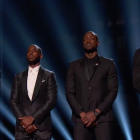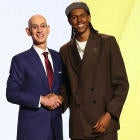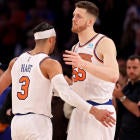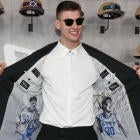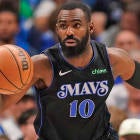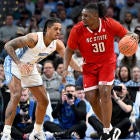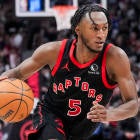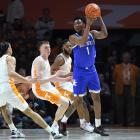There was a story a while back about how LeBron James, Carmelo Anthony, Dwyane Wade and Chris Paul wanted to team up some day on the same basketball team -- in the current NBA tradition of rivals and fellow stars joining forces instead of competing against each other.
Well, they teamed up on Wednesday night -- in ways that were immeasurably more powerful than any basketball game or team.
In the opening scene of the ESPYS, a sports awards show that on Wednesday proved to be bigger and more important than that, these four athletes separated themselves.
They stood for something more important than putting a ball in a basket or winning championships. Trivial things, in these times.
They spoke powerful words that a nation needed to hear.
They represented the best that sports can be.
They did something that the greatest sportsmen of all time -- Jackie Robinson, Jesse Owens, Muhammad Ali, Kareem Abdul-Jabbar -- did instinctively because it was who they were.
Social and political activism has not always come easily to the modern athlete, who has often lived in a cocoon of his or her own achievements and greatness. And who could blame them? They've been protected from the realities that many of their biggest fans confront every day.
Thank God, there is no slaughter or violence at the NBA Finals or the Super Bowl. Each shootaround and practice and training camp just spills into the next. Life is a buffet -- pregame, postgame, and everything in between.
Remember the infamous line from Michael Jordan, when he refused to support a black Democratic congressional candidate in his home state of North Carolina? "Republicans buy sneakers, too," he said.
And people all races, creeds, colors, religions and sexual orientations have bought shoes from him over the years. But to what end?
In 2011, when James' place in history (and even in the present, at that time) was still very much in flux, I asked some of the most thoughtful people I could find in basketball what he could do to someday separate himself from Jordan's overwhelming shadow. The best answer I got was from Ray Allen, who immediately zeroed in on politics and social activism.
And remember, this was a time when we weren't being confronted with almost daily slaughter from gun violence in our streets, as we are today.
"Mike paved the way for all of us to open up the endorsement door," Allen said. "But the one thing that Mike never was is political. I think in today's era, the NBA player has an even greater podium if he chooses to use it. And with Barack Obama being the first black President, it's a great forum. I think that would separate him from anybody who's done this."
James has not always been comfortable with the bully pulpit that sports superstardom provides -- and in some ways, demands. There was a time in his first tour of duty in Cleveland when one of his teammates, Ira Newble, started a petition denouncing genocide in Darfur. James' response? He needed more time and information before taking a stand on the issue.
He wasn't comfortable in his own skin then, wasn't confident in his ability to influence opinions or take a stand.
On Wednesday night, he was.
What has happened in our country recently -- and even not so recently -- has raised the level of consciousness and responsibility for sports stars. There have been so many mass shootings and senseless slaughters of innocents at the hands of firearms that we can barely keep track anymore.
Columbine happened 19 years ago. Twenty children were slaughtered at Sandy Hook Elementary School nearly four years ago.
A month ago, dozens of people were senselessly murdered when a gay nightclub in Orlando was transformed into a killing field.
For no damn good reason.
Just a week ago, five Dallas police officers were mowed down in a hail of sniper bullets during an otherwise peaceful protest over the fatal police shootings of black men in Minnesota and Louisiana.
I mean, seriously, this is real life? This is the society we're living in?
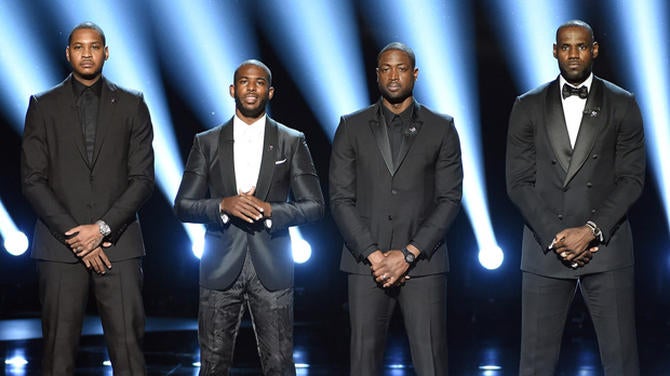
As the black (and Latino, in Anthony's case) NBA stars stood shoulder-to-shoulder on Wednesday night to speak out on the insanity of it all, Wade -- now a member of his hometown Chicago Bulls -- struck the most emotional chord.
"The racial profiling has to stop," Wade said. "The shoot-to-kill mentality has to stop. Not seeing the value of black and brown bodies has to stop. But also, the retaliation, has to stop. The endless gun violence in places like Chicago, Dallas, not to mention Orlando, it has to stop.
"Enough!" Wade said. "Enough is enough."
Powerful. Just what we needed to hear.
In case you've become so numb to all the killing that you've forgotten some of the names, Paul recited them for you. He did so right after pointing out that he's the nephew of a police officer -- "one of the thousands of great officers serving this country," he said.
"But," Paul said, "Trayvon Martin. Michael Brown. Tamir Rice. Eric Garner. Laquan McDonald. Alton Sterling. Philando Castile. This is also our reality."
Said Anthony: "We cannot ignore the realities of the current state of America. The system is broken. The problems are not new. The violence is not new. And the racial divide is definitely not new. But the urgency to create change is at an all-time high."
Wade was incredible; by far his best performance in a distinguished career in the public eye.
"As athletes," Wade said, "it's on us to challenge each other to do even more than what we already do in our own communities.
"And the conversation," he said, his voice rising, "it cannot -- it cannot stop, as our schedules get busy again. It won't always be convenient; it won't. It won't always be comfortable. But it is necessary."
James, who once needed to do more research before taking a public stand against genocide, said it's time for athletes to "look in the mirror."
"What are we doing to create change?" James asked. "It's not about being a role model. It's not about our responsibilities to the tradition of activism."
And then he referenced how the broadcast was dedicated to the great Ali, who died last month after a long battle with Parkinson's disease -- his instincts and insistence on activism sadly silenced.
"To do his legacy any justice," James said, "let's use this moment as a call to action for all professional athletes to educate ourselves. Explore these issues. Speak up. Use our influence. And renounce all violence. And most importantly? Go back to our communities. Invest our time, our resources, help rebuild them, help strengthen them, help change them. We all have to do better."
We all do. There is no question about that.









